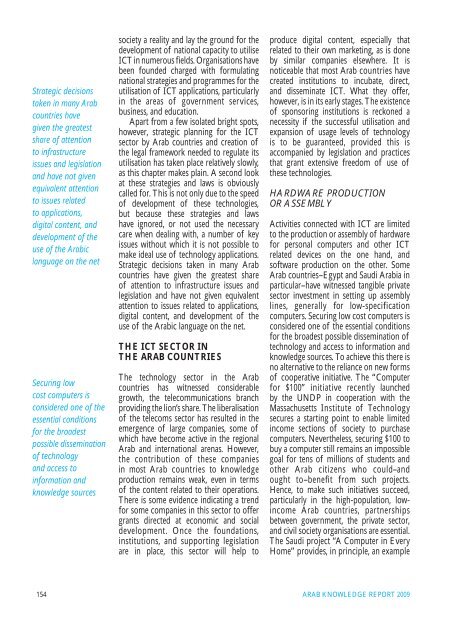Arab Knowledge Report 2009: Towards Productive
Arab Knowledge Report 2009: Towards Productive
Arab Knowledge Report 2009: Towards Productive
- No tags were found...
Create successful ePaper yourself
Turn your PDF publications into a flip-book with our unique Google optimized e-Paper software.
Strategic decisionstaken in many <strong>Arab</strong>countries havegiven the greatestshare of attentionto infrastructureissues and legislationand have not givenequivalent attentionto issues relatedto applications,digital content, anddevelopment of theuse of the <strong>Arab</strong>iclanguage on the netSecuring lowcost computers isconsidered one of theessential conditionsfor the broadestpossible disseminationof technologyand access toinformation andknowledge sourcessociety a reality and lay the ground for thedevelopment of national capacity to utiliseICT in numerous fields. Organisations havebeen founded charged with formulatingnational strategies and programmes for theutilisation of ICT applications, particularlyin the areas of government services,business, and education.Apart from a few isolated bright spots,however, strategic planning for the ICTsector by <strong>Arab</strong> countries and creation ofthe legal framework needed to regulate itsutilisation has taken place relatively slowly,as this chapter makes plain. A second lookat these strategies and laws is obviouslycalled for. This is not only due to the speedof development of these technologies,but because these strategies and lawshave ignored, or not used the necessarycare when dealing with, a number of keyissues without which it is not possible tomake ideal use of technology applications.Strategic decisions taken in many <strong>Arab</strong>countries have given the greatest shareof attention to infrastructure issues andlegislation and have not given equivalentattention to issues related to applications,digital content, and development of theuse of the <strong>Arab</strong>ic language on the net.THE ICT SECTOR INTHE ARAB COUNTRIESThe technology sector in the <strong>Arab</strong>countries has witnessed considerablegrowth, the telecommunications branchproviding the lion’s share. The liberalisationof the telecoms sector has resulted in theemergence of large companies, some ofwhich have become active in the regional<strong>Arab</strong> and international arenas. However,the contribution of these companiesin most <strong>Arab</strong> countries to knowledgeproduction remains weak, even in termsof the content related to their operations.There is some evidence indicating a trendfor some companies in this sector to offergrants directed at economic and socialdevelopment. Once the foundations,institutions, and supporting legislationare in place, this sector will help toproduce digital content, especially thatrelated to their own marketing, as is doneby similar companies elsewhere. It isnoticeable that most <strong>Arab</strong> countries havecreated institutions to incubate, direct,and disseminate ICT. What they offer,however, is in its early stages. The existenceof sponsoring institutions is reckoned anecessity if the successful utilisation andexpansion of usage levels of technologyis to be guaranteed, provided this isaccompanied by legislation and practicesthat grant extensive freedom of use ofthese technologies.HARDWARE PRODUCTIONOR ASSEMBLYActivities connected with ICT are limitedto the production or assembly of hardwarefor personal computers and other ICTrelated devices on the one hand, andsoftware production on the other. Some<strong>Arab</strong> countries–Egypt and Saudi <strong>Arab</strong>ia inparticular–have witnessed tangible privatesector investment in setting up assemblylines, generally for low-specificationcomputers. Securing low cost computers isconsidered one of the essential conditionsfor the broadest possible dissemination oftechnology and access to information andknowledge sources. To achieve this there isno alternative to the reliance on new formsof cooperative initiative. The “Computerfor $100” initiative recently launchedby the UNDP in cooperation with theMassachusetts Institute of Technologysecures a starting point to enable limitedincome sections of society to purchasecomputers. Nevertheless, securing $100 tobuy a computer still remains an impossiblegoal for tens of millions of students andother <strong>Arab</strong> citizens who could–andought to–benefit from such projects.Hence, to make such initiatives succeed,particularly in the high-population, lowincome<strong>Arab</strong> countries, partnershipsbetween government, the private sector,and civil society organisations are essential.The Saudi project “A Computer in EveryHome” provides, in principle, an example154 ARAB KNOWLEDGE REPORT <strong>2009</strong>
















